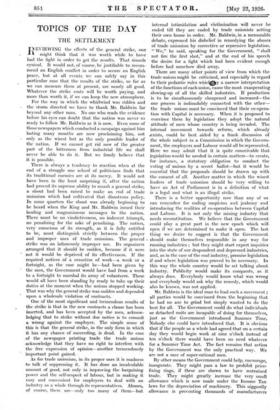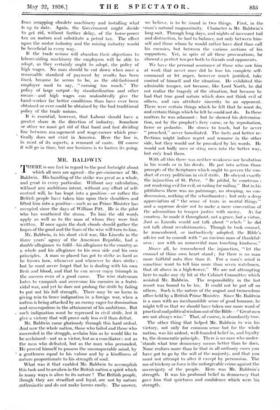TOPICS OF THE DAY
THE SETTLEMENT
REVIEWING the effects of the general strike, one might think that it was worth while to have had the fight in order to get the results. That sounds cynical. It would not, of courses be justifiable to recom- mend an English conflict in order to secure an English peace, but at all events we can safely say in this particular case that the results of the strike, so far as we can measure them at present, are nearly all good. Whatever the strike costs will be worth paying, and more than worth it, if we can keep the new atmosphere.
For the way in which the whirlwind was ridden and • the storm directed we have to thank Mr. Baldwin far beyond any other man. No one who reads the evidence before his eyes can doubt that the nation was never so ready to follow Mr. Baldwin as it is now. Even some of those newspapers which conducted a campaign against him lasting many months are now proclaiming him, not • only as the wisest but as the only possible leader of the nation. If we cannot get rid now of the greater part of the bitterness from industrial life we shall never be able to do it. But we firmly believe that it is possible.
There is always a tendency to reaction when at the end of a struggle one school of politicians finds that its traditional enemies are at its mercy. It would not have been in the least surprising if, after the nation had proved its supreme ability to smash a general strike, a shout had been raised to make an end of trade unionism which had cultivated that disastrous policy. In some quarters the shout was already beginning to be heard when the King and Mr. Baldwin issued their healing and magnanimous messages to the nation. There must be no vindictiveness, no indecent triumph, no penalizing for the sake of penalizing. The nation, very conscious of its strength, as it is fully entitled to be, must distinguish strictly between the proper and improper uses of trade unionism. The general strike was an infamously improper use. Its organizers arranged that it should be sudden, because if it were not it would be deprived of its effectiveness. If the required notices of a cessation of work—a week or a fortnight, as the case might be—had been given by the men, the Government would have had from a week to a fortnight to marshal its army of volunteers. These would all have been standing by ready to take up their duties at the moment when the unions stopped working. That was why the general strike was sudden and depended upon a wholesale violation of contracts.
One of the most significant and tremendous results of • the strike is that in the new contracts a clause has been inserted, and has been accepted by the men, acknow- ledging that to strike without due notice is to commit a wrong against the employer. The simple sense of this is that the general strike, in the only form in which it has any chance of succeeding, is dead. In the case of the newspaper printing trade the trade unions acknowledge that they have no right to interfere with the free expression of opinion—another tremendously important point gained.
As for trade unionism, in its proper uses it is madness to talk of suppressing it. It has done an incalculable amount of good, not only in improving the bargaining power and the self-respect of labour, but in making it easy and convenient for employers to deal with an industry as a whole through its representatives. Abuses, of course, there are—only too many of them—but internal intimidation and victimization will never be ended till they are ended by trade unionists setting their own house in order. Mr. Baldwin, in a memorable debate, expressed his disbelief in remedying the abuses of trade unionism by corrective or repressive legislation.
" We," he said, speaking for the Government, " shall not fire the first shot," and at the end of his speech - the desire for a fight which had been evident enough before had somehow died away.
There are many other points of view from which the trade unions might be criticized, and especially in regard to their pedantic rules whicey a narrow interpretation of the functions of each union, cause the most exasperating slowing-up of all the skilled, industries. If production is to be simultaneously cheapened and increased—the one process is indissolubly connected with the other— the trade unions must be convinced that their co-opera- tion with Capital is necessary. When it is proposed to convince them by legislation they adopt the natural attitude of men whose country is being invaded. The internal movement towards reform, which already ,exists, could be best aided by a frank discussion of the whole subject in a Commission in which the Govern- ment, the employers and Labour would all be represented. Here we may admit that it is quite conceivable that legislation would be needed in certain matters—to create, for instance, a statutory obligation to conduct the voting of unions by a secret ballot—but it would be essential that the proposals should be drawn up with the consent of all. Another matter in which the wisest leaders of trade unionism should be very willing to have an Act of Parliament is in a definition of what is a legal and what is an illegal strike.
There is a better opportunity now than any of us can remember for ending suspicion and jealousy and introducing the realities of co-operation between Capital and Labour. It is not only the mining industry that needs reconstitution. We believe that the Government could play a great part in the new epoch which will open if we are determined to make it open. The last thing we desire to suggest is that the Government . should make themselves responsible in any way for running industries ; but they might start expert inquiries into the state of our despondent and depressed industries, and, as in the case of the coal industry, promise legislation if and where legislation was proved to be necessary. In this way the whole country would be set talking about industry. Publicity would make its conquests, as it always does. Everybody would know what was wrong and everybody would ask why the remedy, which would also be known, was not applied.
Mr. Baldwin is the ideal man to lead such a movement ; all parties would be convinced from the beginning that he had no axe to grind but simply wanted to do the best for all. The Government could do what individuals or detached units are incapable of doing for themselves, just as the Government introduced Summer Time. Nobody else could have introduced that. It is obvious that if the people as a whole had agreed that on a certain day they would begin work at nine o'clock instead of ten o'clock there would have been no need whatever for a Summer Time Act. The fact remains that action by the Government was the only practical way. We are not a race of super-rational men.
By other means the Government could help, encourage, inaugurate. They might pass a law to prohibit price- fixing rings, if these are shown to have restrained trade. They might greatly increase the very small allowance which is now made under the Income Tax laws for the depreciation of machinery. This niggardly allowance is preventing thousands of manufacturers from scrapping obsolete machinery and installing what is up to date. Again, the Government might decide to get rid, without further delay, of the horse-power tax on motors and substitute a petrol tax. The effect upon the motor industry and the mining industry would be beneficial in every way.
If the trade unions will abandon their objections to labour-aiding machinery the employers will be able to adopt, as they certainly ought to adopt, the policy of high wages. No man should be cut down when once a reasonable standard of payment by results has been fixed, because he seems to be, as the old-fashioned employer used to say, " earning too much." The policy of large output—by standardization and other means—and high wages can undoubtedly give the hand-worker far better conditions than have ever been obtained or ever could be obtained by the bad traditional policy of the trade unions.
It is essential,- however, that Labour should have a greater share in the direction of industry. Somehow or other we must get rid of that hard and fast dividing line between malagement and wage-earner which prac- tically. does not exist in America. Here the line is, in most of its aspects, a remnant of caste. Of course it will go in time, but our business is to hasten its going.















































 Previous page
Previous page